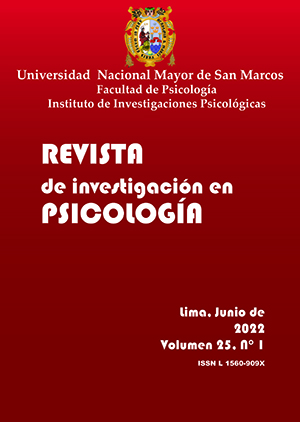Perceived Social Support and Dark Triad in Students and Health Professionals
DOI:
https://doi.org/10.15381/rinvp.v25i1.22408Keywords:
dark triad, social support, health professionals, studentsAbstract
Introduction: Health workers are one of the most vulnerable populations that’s because the various stressors that they must face in the care of patients and the emotional consequences that this causes. Objective: To know the relationship between the perceived social support and the dark triad of personality in health professionals and students. Method: A total of 277 people were recruited, made up of 118 students from health careers, of which 74 are women and 44 are men; the second group was made up of 159 health professionals of which 111 are women and 48 men. This study took into account the Perceived Social Support Questionnaire (MOS) and the Dirty Dozen Dark Triad (DDDT) instruments. Result: A correlation was found between the variables, in the group of students, the results showed statistically significant correlations between perceived social support and machiavellianism (-.0.238, p<.01; r2=.06) and psychopathy (-.316, p<.001, r2=.10). However, in the group of professionals, only a statistically significant relationship was found between perceived social support and psychopathy (-.0.248, p<.01; r2=.06). Also, statistically significant differences were evidenced between both groups (p <.05) both in perceived social support with the dimensions of the dark triad, their size ranged from trivial to medium, with values d= -0.0229 a -0.093 y rbis= -0.350 for psychopathy, narcissism and Machiavellianism respectively. Conclusions: People who perceive social support would have less intensity the trait characterized by interpersonal manipulation and lack of empathy. Furthermore, no statistically significant relationship was found with narcissism.
Downloads
Published
Issue
Section
License
Copyright (c) 2022 Lian Enrique Hernández Acevedo, Rosa María Acosta Huayama

This work is licensed under a Creative Commons Attribution 4.0 International License.
THE AUTHORS RETAIN THEIR RIGHTS:
a. The authors retain their trademark and patent rights, and also on any process or procedure described in the article.
b. The authors retain the right to share, copy, distribute, execute and publicly communicate the article published in the Journal of Research in Psychology (for example, place it in an institutional repository or publish it in a book), with acknowledgment of its initial publication in the Journal of Research in Psychology.
c. Authors retain the right to make a subsequent publication of their work, to use the article or any part of it (for example: a compilation of their work, lecture notes, thesis, or for a book), provided that they indicate the source. of publication (authors of the work, magazine, volume, number and date).























